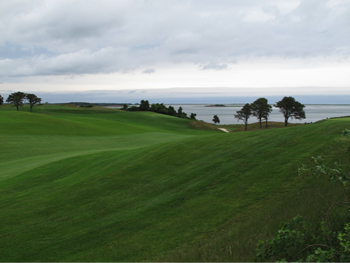
Conserving the Cape: From Golf Courses to Gardens
by Tina Newberry and Kathy Conard
What images does a summer day conjure up in your mind? Bright yellow irises swaying in the breeze, Cape Cod roses beckoning to bloom, the vibrant blues of the Cape's signature Hydrangea, quiet walks on windswept beaches, or soaking rains that quench the thirst of vibrant landscapes.
Summer is also thriving at the Cape's many golf courses that are abundant with colorful landscapes as well as bird and wildlife sanctuaries. Early in the morning golfers hear the eager chirps of baby birds waiting for breakfast to be served or a red-tailed hawk gliding low and scouting along the waterway. Turtles sun themselves while other small, furry creatures scurry and play in the natural, undisturbed grasslands that abound. No matter what your summer pleasure, the Cape has it.

Small Changes. Big Results.
Now that you have a smile on your face, a warm feeling in your belly and a spring in your step, Harrell's, a company committed to beautiful turf, colorful landscapes and environmental stewardship, invites you to join them in Growing a Better World™.
It's time for all of us to become better stewards and implement more sustainable practices on the Cape. "We are very fortunate to be surrounded by such beauty and in order to sustain this natural haven we must protect and preserve it," says Chuck Bramhall, Harrell's employee and life time Cape Cod resident. "I am proud to work for a company that takes conservation and sustainability seriously, not only in the products we offer but in our everyday business practices."
Many of Harrell's employees have converted to more fuel-efficient vehicles for reduced carbon emissions. The Harrell's website offers a nutrient calculator that helps turf managers determine the amount of nutrition that is needed. Plants get only what they need and can use so run-off and leaching is reduced, which protects our environment.
These site-specific, tailored nutritional programs also reduce the need for multiple applications, helping to reduce another carbon footprint of their customers. Harrell's products such as POLYON ® allow landscapers to make fewer applications per year, therefore reducing overall emissions into our atmosphere.
Harrell's is also displacing older chemistries and fertilizers with more environmentally-friendly alternatives; organic choices, products that limit run-off to protect waterways from contamination, and products that reduce the amount of water needed to keep landscape beds and lawns healthy.
Your conservation efforts are equally important, at work and home, inside and out. Even little changes can make a big impact.
Did you know?
- Up to 90% of water used to water lawns can be lost through evaporation. Water from 5 a.m. to 8 a.m. – it's good for your grass, trees and plants and saves water too.
- Approximately two-thirds of residential water use is for toilet flushing and bathing. The use of water-saving toilets, showerheads, and faucets can cut this in half.
Outdoor conservation tips:
- Schedule automatic irrigation systems to water no more than 2 times per week. Turn them off when it rains.
- Position your sprinklers so water lands on the lawn or garden, not on paved areas.
- A good way to see if your lawn needs watering is to step on the grass. If it springs back up when you move, it doesn't need water. If it stays flat, the lawn is ready for watering. Let grass grow taller (to 3") as this will also promote water retention in the soil.
- Water the lawn long enough for the moisture to soak down to the roots where it will do the most good. A light sprinkling can evaporate quickly which means you need to use more water. Put an empty tuna can on your lawn - when it's full, you've watered about the right amount.

- Collect rain from gutters or roofs with a rain barrel and use this free water to water your gardens.
- Many beautiful shrubs and plants thrive with far less watering than other species. Consider applying the principles of Xeriscape or a low-maintenance, drought resistant yard.
Save water and energy inside too:
- Don't run the water while shaving, washing your hands, or brushing your teeth.
- Don't use the toilet as a wastebasket.
- When running tap water to get it hot, divert the initial cool water into a pot or bucket, then use it to water the plants.
- Check your water meter or bill to see how much water you are using. Work on reducing the number of gallons you use.
Environmental Stewardship – not just words today but a way of life for an even better tomorrow.

Tina Newberry, a New England native relocated to Lakeland, Florida with her husband and son. Tina earned her BA in Social Work from the Univerisy of New Hampshire and a BA in Management Information Systems from the University of South Florida. She has over 10 years of marketing experience, specializing in innovative solutions for non-profits and institutions of higher education. Today she focuses on Growing a Better World ™ with Harrell's, LLC

Kathy Conard is owner and President of Kathy Conard Communications. The firm provides counsel and planning tools to help the Green Industry grow and develop and implement outreach and education programs for people in the community about water, environmental stewardship and optimizing efficient use of water resources. Conard is an active participant in the Burlington Township Green Team and heads up the Community Partnership and Outreach Committee.
 |

